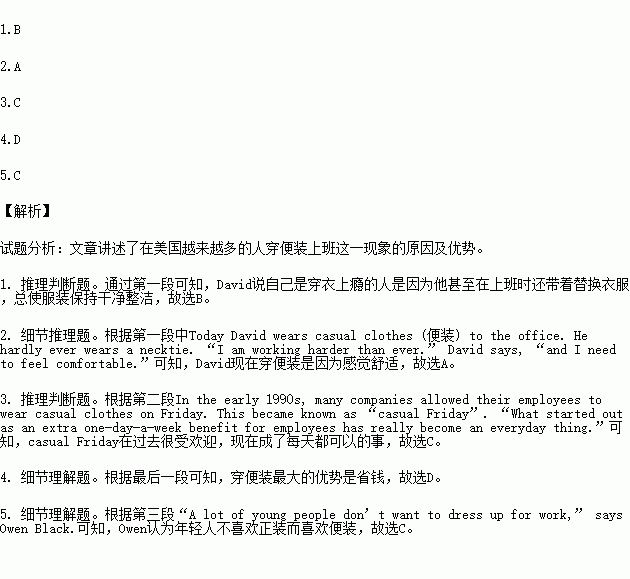题目内容
Five years ago, David Smith wore an expensive suit to work every day. “I was a clothes addict(有瘾的人),” he jokes. “I used to carry a fresh suit to work with me, so I could change if my clothes got wrinkled(有褶皱的).” Today David wears casual clothes (便装) to the office. He hardly ever wears a necktie. “I am working harder than ever.” David says, “and I need to feel comfortable.”
More and more companies are allowing their office workers to wear casual clothes to work. In the United States, the change from formal to casual office wear has been gradual. In the early 1990s, many companies allowed their employees to wear casual clothes on Friday. This became known as “casual Friday”. “What started out as an extra one-day-a-week benefit for employees has really become an everyday thing.” said business consultant Maisly Jones.
Why have so many companies started allowing their employees to wear casual clothes? “One reason is that it’s easier for a company to attract new employees if it has a casual dress code.” “A lot of young people don’t want to dress up for work,” says Owen Black, the owner of a software company, “so it’s hard to hire people if you have a conservative (保守的) dress code.” Another reason is that people seem happier and more productive when they are wearing comfortable clothes. In a study conducted by Levi Company, 85 percent of employers said that they believe that casual dress improves employee morale (心境, 士气). Only 4 percent of employers said that casual dress has a negative influence on productivity. Supporters of casual office wear also argue that a casual dress code helps them save money. “Suits are expensive, if you have to wear one every day,” one person said. “For the same amount of money, you can buy a lot more casual clothes.”
1.David thinks he was “a clothes addict” because .
A. he disliked cheap clothes
B. he always kept his suit neat
C. he often cleaned his office
D. he spent a little on clothes
2.Why does David Smith wear casual clothes now?
A. He feels at ease.
B. He looks handsome.
C. He went to a new company.
D. He can’t afford expensive suits.
3.What can we learn from the text?
A. Casual clothes can impress others.
B. People fought for “Casual Friday”.
C. “Casual Friday” used to be popular.
D. “Casual Friday” was given as a prize.
4.What is the advantage of casual office wear?
A. Making workers more easygoing.
B. Making workers more attractive.
C. Improving workers’ ability.
D. Saving workers’ money.
5.Which does Owen Black probably agree to?
A. Comfortable clothes are cheap.
B. Nobody like conservative clothes.
C. Young people like casual clothes.
D. U.S. employers like casual office wear.

